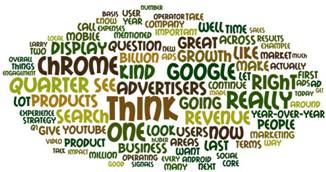Inflation Hits Google, Share Price Falls 14%
Companies / Google Apr 16, 2011 - 12:21 PM GMTBy: PhilStockWorld
The cost of doing business is rising and GOOG happens to be one of those businesses that lacks pricing power as their rates are generally set through an auction process and their users have to VOLUNTEER to pay more money to advertise. Most advertisers on Google are on fixed budgets, like MSM advertisers and Google has done a great job of replicating that model. Why then, should it be surprising if a maturing Google begins to look more like a traditional media outlet than a dot com company with exploding growth?

Don't get me wrong, we love Google long-term but we did short them as well as BIDU into Google earnings as we felt Google would disappoint enough to spook BIDU investors as well. We're taking the short money and running and looking for some bullish plays now - the drop from $630 last month to $545 today is plenty of froth blown off the top for us to get long-term interested again. As you can see from the tag cloud of the Conference Call, growth is still there, especially in mobile display ads (Android a bit disappointing) and no major negatives. I'm not going to write a whole thing about GOOG though, there are thousands of people doing that and our Members know well enough where I stand. I'm more interested in examining the bigger picture.
We expected Q1 earnings to be rough and we've already seen FDX, NKE, ORCL, RIMM, FAST, FCS and AA struggle so hopefully you don't have to be hit on the head with another whole week of earnings before you get a little more cautious. Next week we hear from C, HAL, LLY, TXN, BK, GS, INTC, IBM, SYK, USB, VMW and YHOO on Monday and Tuesday and then we're off to the races with hundreds of companies reporting each week for the rest of the month. Our job in the first few weeks of earnings season is to get a feel for the quarter and, so far, that feeling is rough.
 It's all about inflation, of course and don't say we didn't warn you about that one! We went more bearish up at those 100% lines we've been watching and now the question really is - how bad was it? Inflation is, after all, our long-term BULLISH premise. We don't think corporations are performing better - they are simply benefiting from a weak dollar, a loose labor market, cheap money and a lack of competition (because the weaker ones are going bankrupt). To say this indicates a strong economy is like saying the last few surviving Bald Eagles benefit from having their pick of the best nests now that the rest are dead....
It's all about inflation, of course and don't say we didn't warn you about that one! We went more bearish up at those 100% lines we've been watching and now the question really is - how bad was it? Inflation is, after all, our long-term BULLISH premise. We don't think corporations are performing better - they are simply benefiting from a weak dollar, a loose labor market, cheap money and a lack of competition (because the weaker ones are going bankrupt). To say this indicates a strong economy is like saying the last few surviving Bald Eagles benefit from having their pick of the best nests now that the rest are dead....
I mentioned yesterday that the major indexes are barely keeping up with inflation and we're being led higher by XLE (energy), XME (metals and mining) and, recently, XME (health care) as inflation is the only real growth story we have. Since wages are static, jobs are not increasing and stimulus is absent (in fact austerity is in vogue at the moment), the success of these sectors merely sucks money away from the others. Everyone can't do well at the same time yet the Trade Bots have relentlessly pumped up pretty much all 9,000 publicly traded stocks as if every single one was a gem to be treasured. We began to get bearish when we determined that the physics no longer worked and the cost of propping up the markets was becoming prohibitive - even for blatant, criminal (allegedly) market manipulators like GS (who were handed $800Bn by the Fed to jam up the markets) and the rest of the Gang of 12.
 But we ARE Long-Term bullish. The pattern of inflation is to come first through the commodities, then that puts pressure on margins (this Q) then that forces producers to pass on price increases to the consumers. At that point (Q2), one of 2 things can happen - either commodity prices come back down and there is a large increase in margin (this is what the bulls are betting on, that the commodity spike won't last but low wages will) or the prices will be rejected by consumers who will turn around and demand higher wages and either those will get paid and we begin an inflationary cycle or the wage demands can be rejected and consumers are forced to cut back - leading to yet another recessionary cycle and possibly stagflation if prices don't follow down.
But we ARE Long-Term bullish. The pattern of inflation is to come first through the commodities, then that puts pressure on margins (this Q) then that forces producers to pass on price increases to the consumers. At that point (Q2), one of 2 things can happen - either commodity prices come back down and there is a large increase in margin (this is what the bulls are betting on, that the commodity spike won't last but low wages will) or the prices will be rejected by consumers who will turn around and demand higher wages and either those will get paid and we begin an inflationary cycle or the wage demands can be rejected and consumers are forced to cut back - leading to yet another recessionary cycle and possibly stagflation if prices don't follow down.
So there are many ways this can end badly and only a few it can end well but the overriding fact of the moment is that the Fed is flooding us with money and that money is, for the most part, sitting in bank vaults and on corporate balance sheets so there is plenty of it to hire people and raise wages to pay for all the higher prices and that's the long-term hyper-inflationary premise we're working on at the moment. So far, Q1 earnings have given us no reason to doubt that we are on that path.
A short-term correction would be nice and we'll see what happens now that tax day is passing and the Government has held up the markets long enough to get paid for their efforts. In this morning's Member Chat (at the end of yesterday's comments), we already (again) shorted the oil futures at $108.50 - that's become our little cash machine as they goose that sucker every night and then it sells off once trading begins. Silver is also fun as it crosses below the $42 line as is gold, now crossing under $1,475 but stops are super-important as they jammed everything up yesterday by ditching the Dollar early yesterday.
Once again USO puts should be interesting at the open - we're still waiting for that blow-off sale of the May contracts. Copper continues to weaken as China shows more signs of inflation this morning with March CPI up 5.4% and the PPI up 7.3%, both accelerating over February's reading. This is coming despite a considerable overall economic slowdown as hyperinflation is not a genie that goes easily back in the bottle once you let it out!
We'll see how things play out but caution is the key going forward until (if) we finally break our overhead resistance levels (if earnings do turn around). Meanwhile, we're watching:
- Greek debt is trading over 13%
- Portugal may be much worse, with the IFO calling it a "Bottomless Pit" that is likely to cost Germany "several hundreds of Billions of Euros."
- Moody's cut Ireland 2 more notches
- Fitch cut GE's 2005 Commercial Mortgage Bonds 8 full classes yesterday, which paves the way to many CRE reviews.
- Cash is still flying out of Muni Bonds (and into the market casino)
- The World Bank says food prices "have entered the Danger Zone."
- India's inflation hit 9% in March
Our own CPI came in hot at 0.5% for March, 25% ahead of expectations but core CPI (no food, no energy) was only 0.1% as falling home prices trump the few other items that are left in the core (owner's equivalent rent is 42% of the CPI and pretty much all of the Core CPI - a total joke!). Empire Manufacturing once again gave us a strong report at 21.7, led by a 30% increase in the price index so yipee, I guess. March industrial production was solid at 0.8%, much better than last month, so the markets are rallying on that basis just ahead of the bell - which should make for a nice shorting opportunity and give us good covers on our FAS calls!
Have a great weekend,
Phil
Philip R. Davis is a founder of Phil's Stock World (www.philstockworld.com), a stock and options trading site that teaches the art of options trading to newcomers and devises advanced strategies for expert traders. Mr. Davis is a serial entrepreneur, having founded software company Accu-Title, a real estate title insurance software solution, and is also the President of the Delphi Consulting Corp., an M&A consulting firm that helps large and small companies obtain funding and close deals. He was also the founder of Accu-Search, a property data corporation that was sold to DataTrace in 2004 and Personality Plus, a precursor to eHarmony.com. Phil was a former editor of a UMass/Amherst humor magazine and it shows in his writing -- which is filled with colorful commentary along with very specific ideas on stock option purchases (Phil rarely holds actual stocks). Visit: Phil's Stock World (www.philstockworld.com)
© 2011 Copyright PhilStockWorld - All Rights Reserved Disclaimer: The above is a matter of opinion provided for general information purposes only and is not intended as investment advice. Information and analysis above are derived from sources and utilising methods believed to be reliable, but we cannot accept responsibility for any losses you may incur as a result of this analysis. Individuals should consult with their personal financial advisors.
© 2005-2022 http://www.MarketOracle.co.uk - The Market Oracle is a FREE Daily Financial Markets Analysis & Forecasting online publication.




 Well who'd have thunk it?
Well who'd have thunk it?